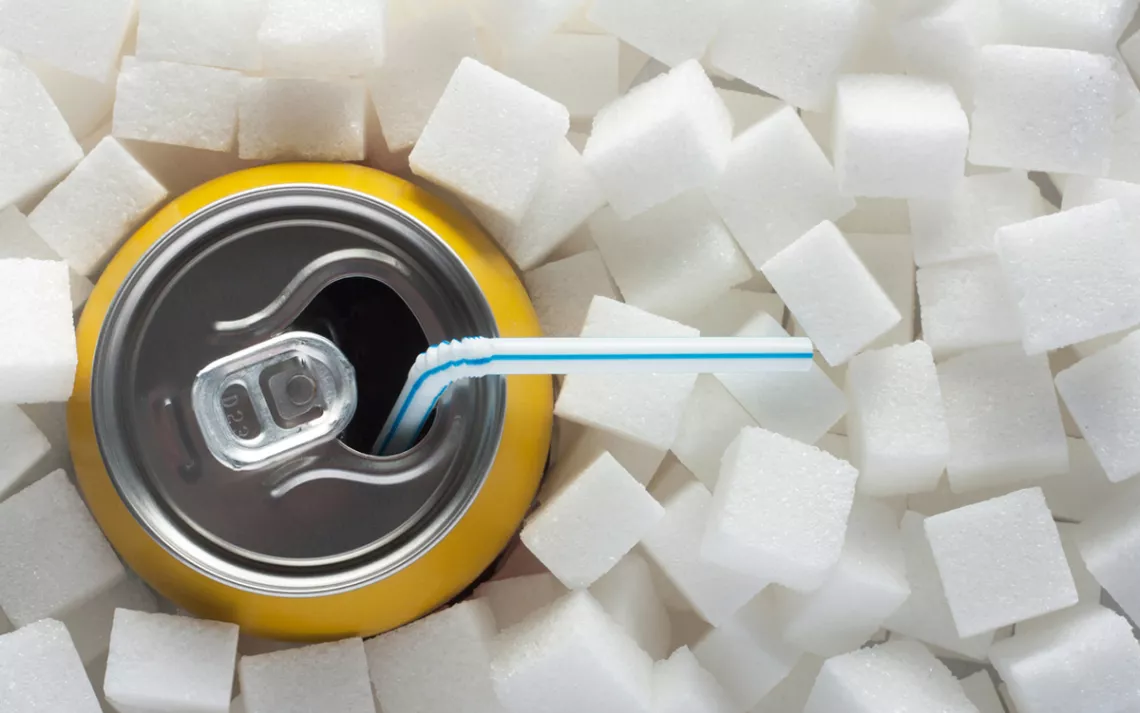After Soda Tax, Philadelphians 40 Percent Less Likely to Guzzle Sugar
It’s sweet news for public health—and potentially the environment
Just two months after a tax of $0.015 per ounce of soda, energy drinks, and other sugary beverages went into effect in the City of Brotherly Love, Philadelphians were already reaching for the sweet stuff significantly less often than their counterparts in nearby cities were. A study published today in the American Journal of Preventive Medicine shows a 40 percent decrease in Philadelphians’ consumption of soda and a 60 percent drop in that of energy drinks.
Taxes on sugary drinks are nothing new: In 2014, Mexico passed the first national soda tax in an effort to combat its obesity rate (the highest in the world), and in 2015, Berkeley, California, kicked off the soda tax movement in the United States. Several cities in Northern California’s Bay Area followed suit, as did Colorado’s Boulder, Oregon’s Portland, and for a short time, Chicago (the Windy City’s tax was notoriously repealed last year following a multimillion-dollar battle between Big Soda and public health groups). While other studies have shown that soda taxes reduce sales of sugary beverages, this is the first study to show a drop in consumption as well, says Amy Auchincloss, an associate professor in Drexel University's Dornsife School of Public Health, who coauthored the paper.
Big Soda’s environmental impacts are not insignificant. Aside from recycling and littering woes, a lot of sodas’ sweetener is made from GMO corn, while the cans that pop comes in are made from resource-intensive virgin aluminium. Evidence suggests that the soda industry grows its colossal profits by targeting kids and people of color. And as a major contributor to health epidemics like obesity, type-2 diabetes, and heart disease, soda also ramps up societal medical costs.
Considering that 30 percent of Philadelphians have at least one sugary beverage each day, even a small drop in consumption could have an impact on public health. “Current pricing structures can make soda overly affordable relative to more nutritious drinks,” Auchincloss says, noting that this disproportionately impacts health in lower-income households.
Kristine Madsen, a pediatrician and a public health professor who worked on Berkeley’s pioneering soda tax, agrees that soda taxes and other flat taxes tend to make a bigger difference in lower-income households. “People in the communities where diabetes affects the biggest proportion of residents are in fact the most likely to stop purchasing soda,” Madsen says. Soda taxes have also prompted some companies to slash the sugar in their beverages, as has already been the case in the United Kingdom’s graduated soda levy, enacted just last week. (Coca-Cola pre-emptively reduced the sugar content of Sprite, Dr. Pepper, and Fanta and is reportedly considering selling smaller cans, in the UK at least.)
To that end, Madsen is troubled by ongoing negotiations over the fate of the North American Free Trade Agreement (NAFTA), as the Trump administration seems to be using trade talks with Mexico and Canada to try to limit governmental ability to use warning labels to inform consumers about the dangers of junk food. “It’s unfortunate that this administration is protecting American manufacturers,” Madsen says, "because such labels have been having a great effect in other countries.”
Philadelphia’s sugary beverage tax is notable in the public health community for being among the most intensive—increasing beverage prices by about 20 percent—and for being the first to extend to diet soda. “Most dietary researchers are not enthusiastic about artificial sweeteners,” says Auchincloss, “which may be associated with abdominal obesity, stroke, and dementia.” Interestingly, Philadelphians’ consumption of sugary fruit drinks such as Snapple and Sunny Delight did not decline, even though they were also taxed. “These drinks may be viewed as healthier than soda, despite having the same amount of added sugar—about 10 packets per 12 ounces,” Auchincloss says.
After the tax, Philadelphia residents also became 58 percent more likely to drink bottled water on a daily basis, causing a more-than-13-percent hike in sales of bottled water. Auchincloss is concerned about new evidence that shows low-income Philadelphians are actually more likely to buy bottled water and less likely to drink out of their home faucets than residents with means. “I think the water crises in Flint, Michigan, and elsewhere have increased consumer concerns about drinking water,” she says, “and many soda companies have gotten into selling bottled water, so increased marketing could be at play, too. It’s tough, because as a result, plastic pollution can put anti-soda-crusade folks at odds with environmentalists.”
However, environmentalists may in fact be wise to take a page from the anti-soda crusade’s playbook, as it demonstrates that cost deterrents can motivate behavior. “Right now, the cost of driving, for instance, is not being passed on to drivers or the auto industry,” Auchincloss explains, “and the cost of not recycling isn’t passed on to residents—so there’s little incentive to change environmentally harmful behavior.”
Adds Madsen, “I think we need to think about a suite of interventions, because the industry needs pressure from the government. We need to think about what incentivizes and influences people’s purchasing decisions. If those choices are costing society money, it’s the government’s role to step in and effect greater balance.”
U.S. city councils are seeing soda taxes as a boon—Berkeley’s one-cent-per-ounce tax goes into the city’s general fund, while Philadelphia is using funds from the tax to expand the availability of pre-kindergarten. It all begs the question of whether some sort of pollution tax could help mitigate environmental crises such as climate change while benefiting towns’ bottom lines. If your city starts drafting plans to tax individual use of carbon or nonrecyclables, please do drop us a line.
 The Magazine of The Sierra Club
The Magazine of The Sierra Club




